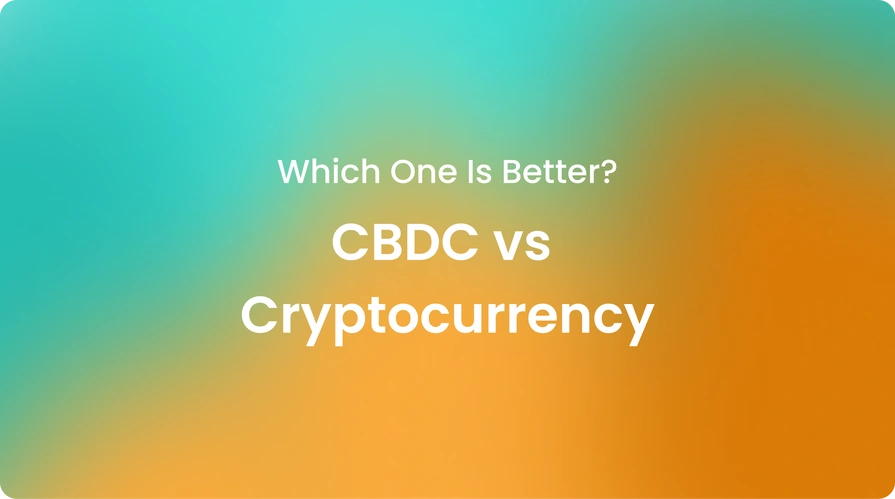|crypto, knowledgehub
CBDC vs Cryptocurrency: Which One Is Better?

Cryptocurrency and CBDCs represent significant shifts in how we think about and use money, and you may wonder about the differences between CBDC vs. cryptocurrency. CBDC stands for central bank digital currencies.
As blockchain technology progresses and more consumers engage in financial activities online, these digital assets have the potential to change the face of global finance.
But which one holds more promise for the future: cryptocurrency or CBDC? Let's take a deeper look at each of these evolving payment rails and explore how they might impact one another!
What is cryptocurrency?
Cryptocurrencies like Bitcoin were some of the earliest applications of blockchain technology. Like physical cash, cryptocurrencies allow for peer-to-peer transactions without an intermediary like a bank.
However, instead of paper bills, cryptocurrencies use cryptography and a decentralized digital ledger known as blockchain technology to securely record and verify all transactions.
This independence from centralized authorities is seen as a key benefit of cryptocurrencies. Transactions are processed via consensus mechanisms among distributed blockchain nodes rather than clearing through centralized payment rails.
In theory, this autonomy of cryptocurrencies could empower individuals with more control over their finances. Over 13,000 types of cryptocurrencies currently exist, with Bitcoin currently dominating as the largest by market cap.
What are the pros and cons of cryptocurrency?
Pros of cryptocurrency
- Independence from the government and banks allows for censorship-resistant transactions.
- Transactions are cheap, fast, and global. Cross-border payments incur little to no fees.
- Supply is limited by algorithms, unlike fiat currencies, which can be printed infinitely. This scarcity contributes to their value over time.
- All transactions are recorded on the public blockchain; therefore, this transparency brings more security.
- There are security protocols like KYC and AML for crypto transactions to keep the system more secure for everyone.
Cons of cryptocurrency
- High volatility makes cryptocurrencies unreliable for storing wealth or serving as mediums of exchange. Prices have been known to fluctuate 20–30% in a day.
- Anonymity enables illicit activities like money laundering, tax evasion, and transactions on dark net markets.
- In many countries, cryptos are not legal tender and can't be used to pay taxes or settle debts. Merchants also don't universally accept them.
- Markets can be manipulated since user bases are still small compared to traditional capital markets.
- 51% attacks are theoretically possible on proof-of-work blockchains, undermining security. Hacks and losses from exchange failures and scams are also common news.
What is the CBDC currency?
Cryptocurrency transactions occur without intermediaries on open ledgers, yet what is CBDC currency, and might its design include controls or limitations compared to crypto's goal of full autonomy?
A CBDC is a digital version of a nation's fiat currency that its central bank issues and controls. It can function similarly to physical cash but resides in digital wallets. China's digital yuan is among the most prominent CBDCs currently being piloted.
What are the pros and cons of CBDC?
Pros of CBDC
- CBDCs provide currency stability lacking in existing cryptocurrencies due to ties to sovereign currency reserves.
- There is potential to boost the financial inclusion of those lacking bank accounts by enabling new digital payment methods. As of 2022, 1.7 billion adults globally remained unbanked.
- Transactions with CBDCs could be faster, cheaper, and more convenient than existing alternatives like cards.
- Central bank digital currencies allow central banks to retain control over monetary policy in the digital era and avoid the risks of private currencies, like loss of seigniorage income.
Cons of CBDC
- Development and maintenance costs for new payment infrastructures could be high for governments implementing CBDCs.
- Privacy may be reduced for citizens compared to physical cash if user transaction history is stored and visible to authorities.
- Transition difficulties exist as CBDCs could undermine or compete with existing payment methods and banks over time.
- The ultimate impact of CBDCs on financial stability, the economy, and the effects of programmable capabilities are still uncertain. Unintended consequences are possible.
In what ways does CBDC differ from cryptocurrency?
While CBDCs and cryptocurrencies both aim to digitize money, there are important distinctions between the two.
Here are the ways CBDC differs from cryptocurrency:
Control
Central banks issue and oversee CBDCs, whereas cryptos are decentralized and not under any authority's control.
Value stability
CBDCs maintain fixed exchange rates for sovereign currencies to avoid volatility, unlike most cryptos. You can check “fixed and floating exchange rates” for details.
Anonymity
CBDCs may not provide anonymity to the same degree as cryptos, depending on their design and AML regulations.
Transaction permanence
Unlike some proof-of-work blockchains, CBDCs wouldn't require energy-intensive crypto mining or include an immutable transaction record visible to all.
Adoption
More merchants may be open to accepting CBDCs than accepting crypto as payment due to their backing by national currencies and the familiar brand names of central banks.
CBDCs offer the stability, security, and usability of fiat currency in a digital form, while cryptos provide greater decentralization and censorship resistance at the cost of higher volatility.
By issuing digital currencies natively, central banks can potentially retain control over monetary policy while gaining the benefits of new technologies in finance. Around 90% of central banks worldwide are actively researching CBDCs, according to the IMF.
However, cryptocurrencies are evolving every day to address the risks and eliminate them. There are also more secure types of cryptocurrencies, such as stablecoins.
Stablecoins bring the power of cryptocurrencies and fiat currencies and offer both of their benefits. They are more risk-free options for many investors.
How does CBDC affect cryptocurrency?
The emergence of CBDCs could significantly impact cryptocurrency usage and growth potential going forward.
Here is how CBDC affects cryptocurrency:
Competition
CBDCs may siphon off some demand and use cases originally meant for cryptocurrencies like digital payments, remittances, and stores of value.
Dampened speculation
If widely adopted, CBDCs could reduce demand for cryptocurrencies as speculative investment vehicles since their values are more stable.
Coexistence
However, cryptocurrencies and CBDCs may also coexist by occupying separate niches. Cryptos would likely continue to serve needs for censorship resistance, borderless transactions, and programmable smart contracts.
Partnerships
Companies in the crypto space like Cryptobunq could integrate CBDCs and help expand their usage, as Cryptobunq offers crypto wallets, blockchain payment solutions, and more. Cryptobunq allows you to hold a euro stablecoin like EURK too.
Innovation
Advancements in cryptocurrency technologies from initiatives like Ethereum could also influence CBDC designs over time regarding capabilities, scalability, or operating efficiencies.
While CBDCs may cut into some cryptocurrency use cases, the two payment rails have the potential to co-evolve and cooperate with one another going forward.
Whether you choose CBDC or cryptocurrency, you need to work with an expert crypto service provider for secure transactions. You can trust CBQ in this regard. CBQ is a one-stop-shop crypto service provider that you can benefit from for a wide range of solutions, from custody and wallet to EURK stablecoin.
Will CBDC replace cryptocurrency?
It remains uncertain if CBDCs will completely replace cryptocurrencies or if both will continue coexisting. While CBDCs offer stability, security, and usability advantages, cryptocurrencies provide distinct features like censorship resistance, programmability, and disintermediation that CBDCs do not.
Given the different value propositions, most experts believe a variety of digital and traditional currencies will interact in complementary roles.
For example, Bitcoin could remain an alternative crypto investment and store of value; Ethereum could be a hub of innovation with smart contracts; and stablecoins and CBDCs primarily facilitate mainstream digital payments and commerce.
Companies like Cryptobunq that support both cryptocurrencies and stablecoins like EURK and other digital assets, such as tokens, may play a bridging role by creating interoperable infrastructure. Therefore, CBQ is here for you to meet your different cryptographic needs with the power of blockchain.
The bottom line
CBDCs are still in their early development stages but represent a viable public infrastructure for digital money. Meanwhile, cryptocurrencies have already demonstrated long-term resilience in different market cycles.
Smart regulation and cooperation between these spheres could maximize the benefits of ongoing technological and financial innovation. Only time will tell how user preferences and these evolving technologies interact in practice going forward.
The most suitable choice between CBDC vs. cryptocurrency depends on your individual and business needs. If you need an expert to guide you and explore your options with expert solutions, contact us. CBQ is here for you for your individual and business-related needs in the blockchain ecosystem!













